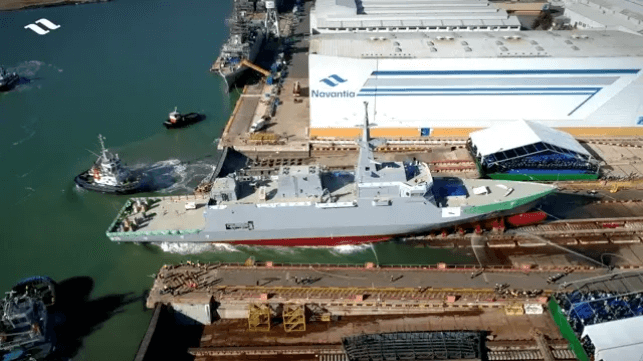Navantia Rides a Wave of Spanish Sales to the Gulf

Saudi Arabia has signed a contract for the delivery of a further three corvettes from Spanish shipbuilder Navantia, based on the company’s Avante 2200 design. The last of an initial batch of five corvettes, HMS Unayzah, was launched in Cádiz in March 2024, joining HMS Al Jubail, Al Diriyah, Hail and Jazan. When the contract was signed in July 2018, it was valued at $1.9 billion.
The delivery of the first five corvettes within six years of contract signature is a testament to the efficiency of the program, which also included life cycle support. 700 crew and maintenance engineers to support the five corvettes have been trained at Navantia’s San Fernando facility, opposite the shipyard in the Bahía de Cádiz.
The five frigates are likely to remain assigned to the Saudi Navy’s Western Fleet, which has responsibility for the Red Sea area - and for facing up to the formidable challenges posed by the Houthi campaign to interdict shipping in the area. In February 2017, the Saudi frigate HMS Al Madinah (F702) was hit by a Houthi unmanned speedboat bomb and two crew were killed.
In awarding contracts to Navantia, the Saudi government was keen to see 50% of the project value delivered in Saudi Arabia, as part of the Saudi Vision 2030 objective to localize defense procurement spending. This has largely been achieved by laying keels in Cadiz, and then barging unfinished vessels to Jeddah for integration of combat systems and fitting out.
Within Saudi Arabia, the 50% domestic value component was highly contentious. The Crown Prince-controlled Public Investment Fund pressed to win this workshare for its SAMI subsidiary, while Saudi ship fitting and building expertise centered on Jeddah - controlled by private and Saudi Ministry of Defence-owned firms - sought to avoid being subsumed into SAMI. Navantia has done well to navigate successfully through these complex Saudi internal politics issues, over which other foreign defence firms have stumbled and failed.
A key player in achieving this success may have been Gonzalo Mateo-Guerrero, who in 2022 was appointed to be the Chief Operating Officer of SAMI, which had by then been allocated overall control of the Saudi share of work. Previously, Mateo-Guerrero was an employee of Navantia and had overseen the Spanish end of the program, setting up the project and overseeing keel laying at Navantia’s shipyard. In his new role for SAMI, for which he was based in Jeddah for two years, Mateo-Guerrero then had oversight of the completion and commissioning of the frigates in Saudi Arabia. He has now returned to Navantia in Spain, and has had a key role in securing the contract extension.
The success of Navantia’s project in Saudi Arabia - at the expense of the French, who used to dominate ship provision and training for the Saudi Navy - is also reflected in the civil arena in Saudi Arabia, where Spanish firms have been key players in the delivery of the $22.5 billion Riyadh metro system. Spanish firms are also delivering a major coastal surveillance and defense project covering Oman’s 2,000-mile-long coastline.
